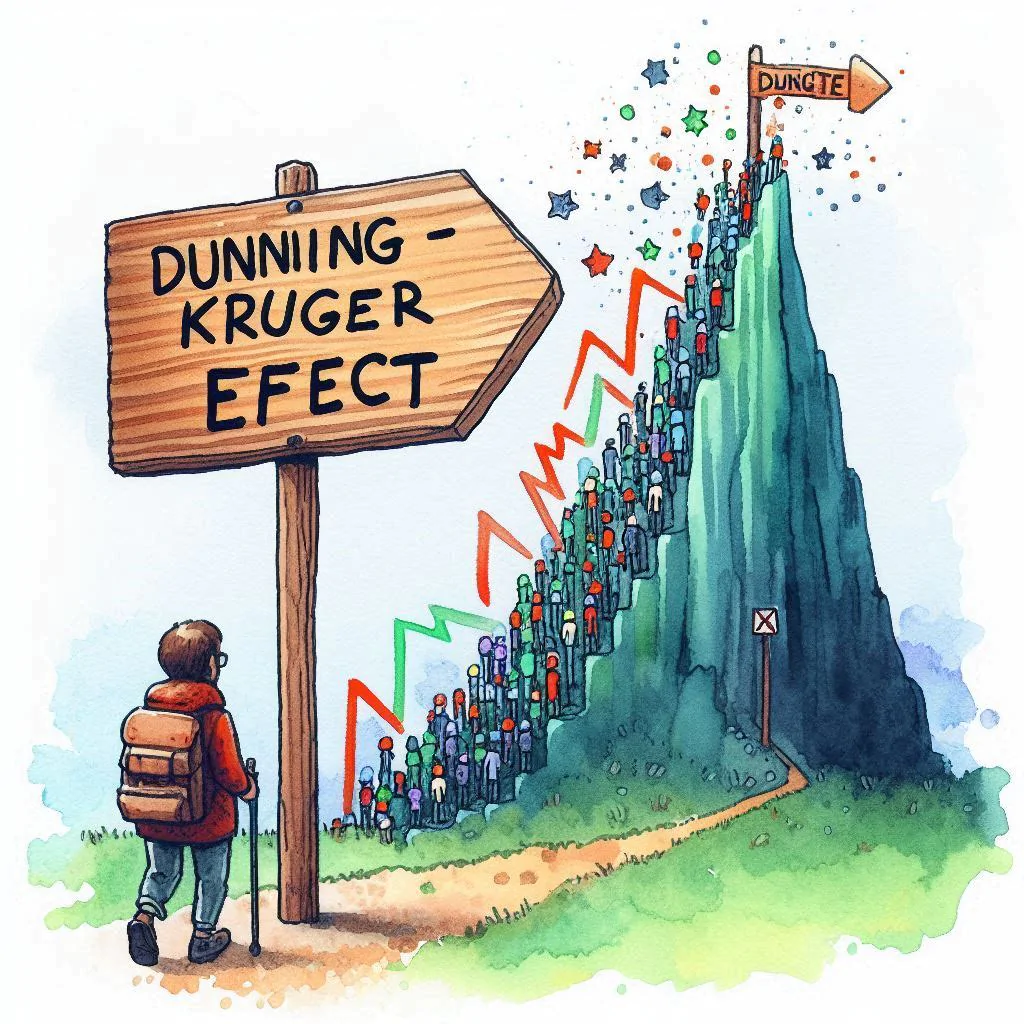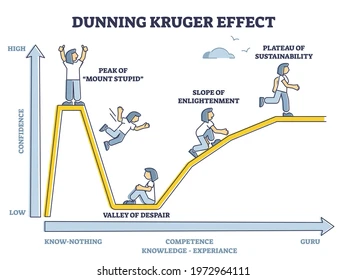Unmasking the Dunning-Kruger Effect: Why We’re Not as Smart as We Think We Are

Have you ever encountered someone who professes expertise in a field they clearly know little about? Or perhaps you’ve caught yourself feeling overly confident in a skill you’ve just begun to learn? If so, you’ve witnessed the Dunning-Kruger effect in action. This fascinating psychological phenomenon sheds light on why we often overestimate our abilities and how our lack of self-awareness can lead us astray. In this deep dive, we’ll explore the intricacies of this cognitive bias, its impact on our daily lives, and most importantly, how to overcome it.
The Dunning-Kruger effect, named after psychologists David Dunning and Justin Kruger, is a cognitive bias where individuals with limited knowledge or expertise in a specific area tend to overestimate their abilities. It’s a prime example of how our self-perception can be wildly out of sync with reality. This effect manifests in various ways in our everyday lives. Consider the novice guitarist who, after learning a few chords, believes they’re ready to headline a music festival. Or think about those individuals who, after reading a few online articles, consider themselves authorities on complex topics like climate change or economic policy. Even that friend who insists on fixing their own car despite having no mechanical experience, only to end up with a bigger problem, is experiencing the Dunning-Kruger effect firsthand.
To truly grasp the Dunning-Kruger effect, we need to delve into the psychology of overconfidence bias and metacognition. Overconfidence bias is our tendency to overestimate our own abilities, knowledge, and the accuracy of our judgments. It’s a close cousin of the Dunning-Kruger effect and often works in tandem with it. Metacognition, or “thinking about thinking,” plays a crucial role in this phenomenon. People with low metacognitive skills struggle to accurately assess their own abilities, leading to inflated self-perceptions. This is closely related to the concept of illusory superiority, a cognitive bias that causes people to overestimate their positive qualities and abilities in relation to others.
The impact of this cognitive bias extends far beyond personal interactions. In professional settings, the Dunning-Kruger effect can have serious consequences. Overconfident employees may take on tasks beyond their capabilities, leading to inefficiencies and costly mistakes. Those who believe they’re already experts may resist further training or development opportunities, hindering their career progression. The presence of a Dunning-Kruger affected individual can disrupt team harmony and productivity, especially if they’re in a leadership position.
Understanding how cognitive biases affect our self-evaluation is crucial to combating the Dunning-Kruger effect. We tend to seek out information that confirms our existing beliefs, reinforcing our inflated self-perception. This confirmation bias can be particularly damaging when combined with the Dunning-Kruger effect. Additionally, we often base our self-assessment on easily recalled information, which may not provide an accurate picture of our abilities. This is known as the availability heuristic. Interestingly, the Dunning-Kruger effect can also work in reverse. Highly skilled individuals sometimes underestimate their abilities, assuming tasks that come easily to them must be simple for everyone..

The Psychology Behind the Bias:
To truly grasp the Dunning-Kruger effect, we need to delve into the psychology of overconfidence bias and metacognition.
1. Overconfidence Bias in Psychology:
Overconfidence bias is our tendency to overestimate our own abilities, knowledge, and the accuracy of our judgments. It’s a close cousin of the Dunning-Kruger effect and often works in tandem with it.
2. Metacognition and Self-Awareness:
Metacognition, or “thinking about thinking,” plays a crucial role in the Dunning-Kruger effect. People with low metacognitive skills struggle to accurately assess their own abilities, leading to inflated self-perceptions.
3. Illusory Superiority Explanation:
Illusory superiority is the cognitive bias that causes people to overestimate their positive qualities and abilities in relation to others. This phenomenon contributes significantly to the Dunning-Kruger effect.
The Dunning-Kruger Effect in the Workplace:
The impact of this cognitive bias extends far beyond personal interactions. In professional settings, the Dunning-Kruger effect can have serious consequences:
1. Misallocation of Resources: Overconfident employees may take on tasks beyond their capabilities, leading to inefficiencies and costly mistakes.
2. Stunted Professional Growth: Those who believe they’re already experts may resist further training or development opportunities, hindering their career progression.
3. Team Dynamics: The presence of a Dunning-Kruger affected individual can disrupt team harmony and productivity, especially if they’re in a leadership position.
Cognitive Bias in Self-Assessment:
Understanding how cognitive biases affect our self-evaluation is crucial to combating the Dunning-Kruger effect:
1. Confirmation Bias:
We tend to seek out information that confirms our existing beliefs, reinforcing our inflated self-perception.
2. Availability Heuristic:
We often base our self-assessment on easily recalled information, which may not provide an accurate picture of our abilities.
3. Dunning-Kruger Effect in Reverse:
Interestingly, highly skilled individuals sometimes underestimate their abilities, assuming tasks that come easily to them must be simple for everyone.
The gap between how we view ourselves and how others perceive us is at the heart of the Dunning-Kruger effect. This discrepancy can lead to various challenges in our personal and professional lives. Overestimating our social skills can result in uncomfortable interactions and missed social cues. Upon failure a distorted self-image can lead to poor career choices or missed opportunities for growth. In relationships, overconfidence in one’s interpersonal skills can strain personal connections and hinder effective communication.
Recognizing and mitigating the Dunning-Kruger effect in ourselves is crucial for personal and professional growth. One of the most effective strategies is to embrace lifelong learning. By cultivating a growth mindset and acknowledging that there’s always more to learn, we can combat the tendency to overestimate our expertise. Regularly seeking honest feedback from peers, mentors, and supervisors can help us gain a more accurate picture of our abilities. Developing our metacognitive skills through regular self-reflection and performance assessment is another powerful tool. It’s also important to challenge our assumptions by questioning our beliefs and seeking out information that contradicts our current understanding. Surrounding ourselves with diverse perspectives by engaging with people who have different backgrounds and expertise can broaden our horizons and help us recognize the limits of our knowledge.
The implications of the Dunning-Kruger effect extend beyond individual experiences, affecting society as a whole. In political discourse, this cognitive bias can contribute to polarization and the spread of misinformation. In education, students affected by the Dunning-Kruger effect may resist learning new information that challenges their perceived expertise.
The Dunning-Kruger effect serves as a humbling reminder of our cognitive limitations and the importance of self-awareness. By recognizing this bias in ourselves and others, we can foster a more realistic self-perception, leading to better decision-making and personal growth. As we navigate an increasingly complex world, the ability to accurately assess our knowledge and skills becomes ever more crucial. True wisdom lies not in knowing everything, but in recognizing how much we have yet to learn.
So, the next time you feel tempted to proclaim your expertise in a field you’ve just begun to explore, take a step back. Embrace the journey of learning, seek out diverse perspectives, and cultivate a healthy dose of intellectual humility. In doing so, you’ll not only overcome the Dunning-Kruger effect but also open yourself up to a world of growth and discovery.
It’s worth noting that the Dunning-Kruger effect is not the same as impostor syndrome. While the Dunning-Kruger effect involves overestimating one’s abilities, impostor syndrome leads individuals to underestimate their competence despite evidence of their success. It’s also important to understand that even highly intelligent people can experience the Dunning-Kruger effect. Intelligence doesn’t make one immune to cognitive biases, and even experts in one field can fall prey to this effect when venturing into unfamiliar territory.
Organizations can combat the Dunning-Kruger effect in the workplace by implementing regular skills assessments, encouraging a culture of continuous learning, and providing constructive feedback to help employees develop a more accurate self-perception. While the effect has been observed across various cultures, its manifestation may differ based on cultural norms and values surrounding self-perception and humility.
Awareness of the Dunning-Kruger effect is a crucial first step in mitigating its impact, but it’s not a guaranteed solution. Actively working on metacognitive skills and seeking external feedback are essential for truly overcoming this cognitive bias. By exploring the Dunning-Kruger effect, we gain valuable insights into human psychology and the complexities of self-perception. Armed with this knowledge, we can strive for greater self-awareness and a more balanced understanding of our abilities and limitations. Remember, the path to true expertise is paved with humility, curiosity, and a willingness to learn from others.
FAQs
1. Is the Dunning-Kruger effect the same as impostor syndrome?
No, they’re actually opposite phenomena. While the Dunning-Kruger effect involves overestimating one’s abilities, impostor syndrome leads individuals to underestimate their competence despite evidence of their success.
2. Can highly intelligent people experience the Dunning-Kruger effect?
Absolutely. Intelligence doesn’t make one immune to cognitive biases. Even experts in one field can fall prey to the Dunning-Kruger effect when venturing into unfamiliar territory.
3. How can organizations combat the Dunning-Kruger effect in the workplace?
Companies can implement regular skills assessments, encourage a culture of continuous learning, and provide constructive feedback to help employees develop a more accurate self-perception.
4. Is the Dunning-Kruger effect a universal phenomenon?
While the effect has been observed across various cultures, its manifestation may differ based on cultural norms and values surrounding self-perception and humility.
5. Can awareness of the Dunning-Kruger effect help prevent it?
While awareness is a crucial first step, it’s not a guaranteed solution. Actively working on metacognitive skills and seeking external feedback are essential for mitigating the effect.
The Dunning-Kruger effect serves as a humbling reminder of our cognitive limitations and the importance of self-awareness. By recognizing this bias in ourselves and others, we can foster a more realistic self-perception, leading to better decision-making and personal growth. As we navigate an increasingly complex world, the ability to accurately assess our knowledge and skills becomes ever more crucial. Remember, true wisdom lies not in knowing everything, but in recognizing how much we have yet to learn.
So, the next time you feel tempted to proclaim your expertise in a field you’ve just begun to explore, take a step back. Embrace the journey of learning, seek out diverse perspectives, and cultivate a healthy dose of intellectual humility. In doing so, you’ll not only overcome the Dunning-Kruger effect but also open yourself up to a world of growth and discovery.


